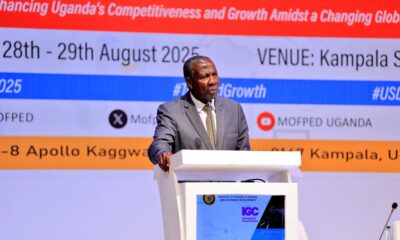News
Tight economic policies help to stem inflation – PSST Ggoobi
PSST Ggoobi lauds frugal steps for stabilizing economy

The Permanent Secretary in the Ministry of Finance and Secretary to the Treasury Ramathan Ggoobi while addressing the media
The Permanent Secretary and Secretary to Treasury Ramathan Ggoobi has hailed a set of tight monetary and fiscal measures that were taken by both the Central Bank and his Ministry in the early part of the current financial year, for helping to stem runaway inflation which which rose sharply around the start of 2022.
Ggoobi made the remarks during a budget transparency briefing for the media and members of the civil society held at the Finance Ministry headquarters this week.
He said: “Annual headline inflation had been on an upward trend since the start of FY2022/23 peaking at 10.7% in October 2022. Following the coordinated monetary and fiscal policy interventions of the Central Bank and this Ministry, respectively, inflation has started declining, being recorded at 10.6% in November and 10.2% for December 2022.”
It may be recalled that the first three months of the financial year July to September 2022, there was an outcry from civil servants about delays by the Finance Ministry to pay them. Reports from the ministry indicated that the delays were a deliberate strategy to slow down inflation while at the same time harmonize the system to taken into consideration salary enhancements.
The PSST reassured civil servants and pledged that the delays would not be repeated.
During the briefing that was attended by members of the members of the Budget Transparency Initiative (BTI) Mr. Ggoobi further noted that other indicators of Uganda’s economy have improved and continue to show signs of economic recovery from the effects of the COVID-19 pandemic and global economic downturn.
“The high frequency indicators of economic activity show improvements in the level of economic activity in Q2 (Second quarter Sep-Dec 2022) compared to Q1 (July – Sept 2022). The Composite Index of Economic Activity (CIEA) averaged 150.73 in Q2 which is 1.6% higher than the average of 148.42 registered in Q1.
He also cited improvements in the Purchasing Managers Index, of 50.2 that was recorded in December 2022, as another sign of things lighting up for business.
“This was the highest since the start of the financial year and was mainly due to growth in demand and output, and employment. To this end, perceptions about doing business within the economy remain positive as shown by the Business Tendency Index (BTI) which remains above the threshold of 50,” asid Mr. Ggoobi.
The increase in lending to the private sector by banks despite a tighter monetary policy situation, Ggoobi pointed out, is another indicator of positive sentiments in the private sector that also points to increased investment, recovery and more jobs in the near future.
He said: “In spite of the monetary policy tightening, the stock of private sector credit has continued to grow. As of November 2022, the stock was UGX 19,886 billion which implies a growth of 0.4% from the 19.808billion at the end of FY 2021/22.
The relative improvements in the inflation situation in the country, as well as positive outlook from business sector as shown by increased demand for credit, have been supplemented by a stronger balance of payment position for Uganda in recent months and a stronger shilling.
According to PS Ggoobi, Uganda’s trade deficit reduced from US$318m recorded in July to US$299m recorded in November 2022.
PSST Insists on transparency in budget disbursements
During the same meeting, the Ministry of Finance announced that it has released all the funds for Quarter 3, as budgeted by the government for the financial year 2022/23.
PSST Ggoobi told stakeholders who included journalists and members of the civil society on budget advocacy that his ministry has released UGX6.369billion representing 24.5% of the discretionary budget for the current quarter.
The releases indicate that the government is implementing its budget as planned, are an indicator that the treasury is solvent and will largely meet the obligations of the state.
Members of the BTI group however reported to the PSST that although funds are released on time, government agencies continue to decry delays in accessing the money, which not only delays access to services by Ugandans but also contributes to return of billions of shillings of unspent funds to the consolidated fund.
Responding to the outcry, PSST Ggoobi blamed the delays on accounting officers from the various departments to submit quarterly performance reports, which are a pre-requisite for access to new funds.
Below are the highlights of the latest funds release.
- UGX1.792 trillion for Wages, including salary enhancement for scientists and UPDF.
- UGX128 billion for payment of pension for retired civil servants and UGX132bn for payment of gratuity in quarter 3.
- Payment of all capitation grants to government-aided schools to cater for Term One 2023.
- UGX122.4 billion given to NMS to buy drugs
- UGX385bn given to UNRA for compensation of landlords for ongoing projects.
- Universities have received UGX143billion to cater for their semester requirements.
The PSST cautioned all accounting officers to prioritize payment of service providers on time to avoid accumulation of arrears.
The PSST warned civil servants without National Identification documents that they risk missing out on salaries since the government intends to integrate the NIN numbers in the government payroll.
“The National Identification Numbers will be used in the confirmation of payment of wages, pensions and gratuity,” said Ggoobi.
As a means to prevent pile-up of debt on utilities, Ggoobi directed that all government institutions to ensure that they pay for utilities (water and electricity) before using the service, or else they are cut off from the service.
Comments


























